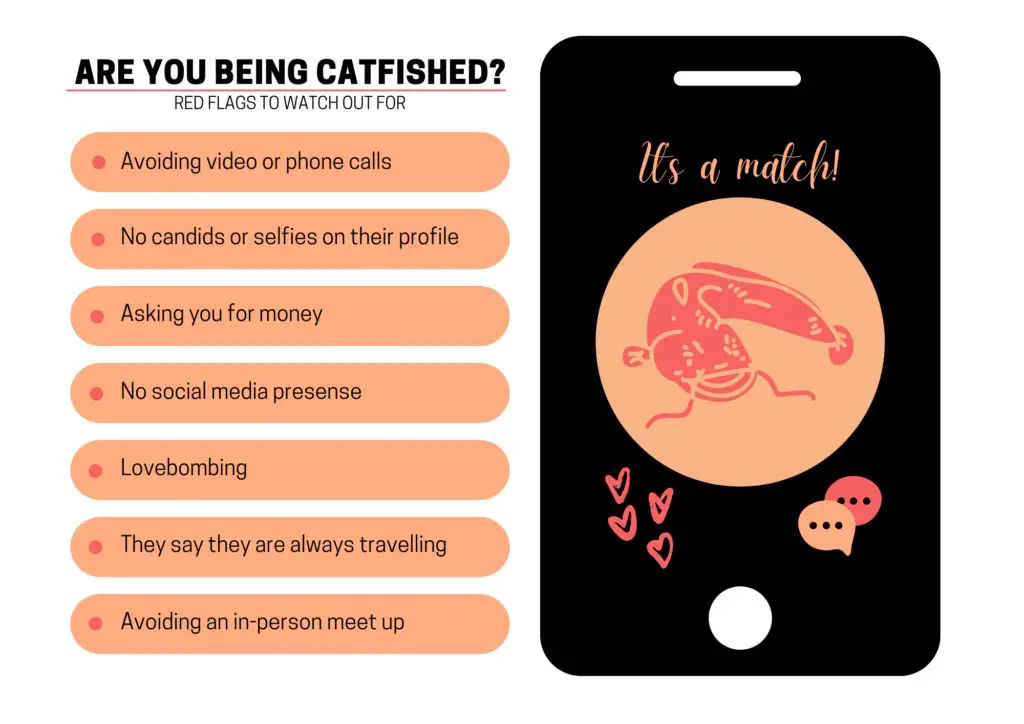What is catfishing?
Catfishing refers to the act of creating a false online identity or persona in order to deceive someone. The term was popularized by the 2010 documentary Catfish, which followed a man who discovered the woman he fell in love with online wasn’t who she claimed to be [1]. According to Merriam-Webster, to catfish means “to pretend to be someone you’re not by posting false information online” [2].
Common tactics used by catfish include [3]:
- Taking someone else’s photos and using them as their own profile pictures
- Fabricating personal details like age, location, occupation, interests
- Creating fake social media accounts and entire online personas
- Lying about life circumstances for sympathy or attention
Motivations for catfishing include loneliness, seeking relationships, financial gain, revenge, living out fantasies, and preying on victims. While some catfish simply enjoy living a different online life, others have more malicious intents like scamming people out of money or eliciting personal information for blackmail.
When catfishing becomes illegal
While posing as someone else online or creating a fake identity may seem harmless at first, catfishing can cross legal lines in certain situations according to FindLaw (https://www.findlaw.com/litigation/filing-a-lawsuit/can-i-sue-someone-for-catfishing-me-.html). Laws related to online impersonation, fraud, harassment, and more may come into play when catfishing activities become criminal.

It is generally illegal to use someone else’s name or likeness to deceive people online. Many states have laws prohibiting identity theft, impersonation, or passing yourself off as someone else. You could face criminal charges for using someone’s identity or photos without their consent as part of a catfishing scheme.
Catfishing often becomes illegal when it involves fraudulently obtaining money or gifts. According to the Anderson Law Firm (https://kirkandersonlaw.com/when-catfishing-becomes-criminal-fraud/), you may face wire fraud, money laundering, or Racketeer Influenced and Corrupt Organizations (RICO) charges for certain catfishing activities like pretending to be a romantic partner to gain money or gifts.
Stalking, harassment, defamation, or threatening behavior related to catfishing could also lead to criminal charges in some instances. Overall, if your catfishing causes significant harm, involves illegal deception for financial gain, or violates laws designed to protect people’s identities and safety, you may face legal consequences.
Filing a police report for catfishing
If you believe you are the victim of catfishing and want to file a police report, here are some steps to take:
Contact your local police department’s non-emergency number and explain that you want to file a report about an online imposter or catfish. Many police departments have cybercrime or financial fraud divisions set up to handle these types of complaints.
When filing the report, provide as many details as possible about the catfish, including their online profile information, any photos or details they shared about themselves, their phone number or email address, any money or gifts you provided, and the dates you interacted with them.
According to this source, you may need to visit the police station in person to complete the report and provide evidence like screenshots of conversations.
After filing, follow up regularly with the detective or officer assigned to your case for updates on the investigation. Cybercrime cases can take time, but staying in touch shows you are invested in pursuing charges against the catfish. Also promptly provide any new evidence or information you uncover to aid in the investigation.
Getting a police report filed creates an official record and may help you recover any money or gifts given to the catfish. It also alerts law enforcement to watch out for this criminal activity.
What police can do about catfishing:
If you believe you are the victim of catfishing and want to get law enforcement involved, there are steps police can take to investigate. However, they face certain limitations.
Police may attempt to identify the catfisher by subpoenaing records from social media companies, email providers, and phone companies to uncover the IP address or device used by the perpetrator [1]. They can also work with tech companies to preserve online evidence and track down the catfisher’s digital footprint [2].

However, most social media platforms have restrictions on sharing user data with law enforcement due to privacy policies. Police usually need a warrant or subpoena to access private user information [3]. Additionally, sophisticated catfishers often use VPNs or other means to mask their IP address and avoid identification.
If the catfishing involves serious criminal activity like fraud, theft or threats, police may devote more resources to tracking down the perpetrator. But for most routine catfishing, limitations around subpoenas and online anonymity make it difficult for law enforcement to identify the catfisher without additional evidence.
While police can sometimes gather online evidence and get cooperation from tech companies, successful prosecution ultimately requires proving the catfisher’s intent and actions beyond a reasonable doubt. Since catfishers are skilled at covering their tracks, police face an uphill battle.
[1] https://kirkandersonlaw.com/when-catfishing-becomes-criminal-fraud/
[2] https://www.hg.org/legal-articles/catfishing-is-it-considered-criminal-fraud-48440
[3] https://www.findlaw.com/litigation/filing-a-lawsuit/can-i-sue-someone-for-catfishing-me-.html
Taking legal action for catfishing
Victims of catfishing may choose to pursue legal action against the catfish, especially if the catfishing caused significant damages. Here are some of the legal options available:
Hiring a lawyer
Consulting with a lawyer is often the first step in pursuing legal action. A lawyer can review the details of the case and advise if there are grounds to sue the catfish. They can also send a cease and desist letter demanding the catfish stop impersonating the victim. According to Kirk & Anderson Law, hiring a lawyer demonstrates the victim is serious about taking action.
Suing for damages
A victim may be able to sue the catfish for damages such as emotional distress, lost wages, or costs incurred. According to FindLaw, catfishing that results in financial loss could qualify as fraud, providing grounds for a lawsuit.
Getting a restraining order
If the catfishing poses an ongoing threat, the victim can petition for a restraining order forcing the catfish to cease contact. This can prevent further harassment or abuse by the catfish. Evidence like screenshots of messages may help demonstrate the need for a restraining order.
Protecting yourself from catfishing
There are several steps you can take to avoid falling victim to catfishing:
Watch out for red flags like inconsistencies in someone’s story, refusing to video chat, making endless excuses, and declarations of love very early on (https://www.malwarebytes.com/blog/news/2022/06/5-ways-to-avoid-being-catfished). If something seems too good to be true, it probably is.
Conduct reverse image searches on profile pictures to see if they show up elsewhere online (https://seersco.com/blogs/the-5-most-effective-ways-to-avoid-social-catfishing/). This can reveal stolen or fake photos.
Secure your social media accounts by making them private, being selective with friend requests, and not sharing too many personal details publicly. Be wary of eager strangers (https://www.pcmag.com/how-to/how-to-avoid-getting-catfished).
Take things slowly when getting to know someone online. Ask lots of questions and don’t rush into declaring love or commitment.
Listen to your instincts. If something feels off, disengage and stop communicating with the person.
Educate yourself on common catfishing techniques so you know what to watch out for. Awareness is key to avoiding manipulation.
Support for catfishing victims
Being a victim of catfishing can cause immense emotional and psychological trauma. Many victims feel confused, angry, depressed, and violated after discovering they were manipulated. There are several ways catfishing victims can get support to cope and recover:
Counseling and therapy: Meeting with a mental health professional provides a safe space for victims to process their experience. A counselor can help develop coping skills, manage feelings, and regain self-esteem after being catfished. Therapy often involves identifying thought patterns, expressing emotions, and building confidence.
Online support groups: Connecting with other catfishing victims can provide comfort and advice. Several online forums like Catfish Victim Support on Facebook offer peer support. Sharing stories helps victims feel less alone. Support groups also give practical tips about confrontation, legal action, and preventing further catfishing.
Recovering from trauma: The manipulation involved in catfishing can cause psychological scars similar to PTSD. It takes time and active effort to heal. Self-care, maintaining close relationships, journaling, exercising, etc. can help in the recovery process. Avoiding self-blame and seeking closure are also important steps for catfishing victims.
Confronting a Catfish

If you suspect someone of catfishing you, it’s important to gather evidence and confront them safely. According to WikiHow, some tips for exposing a catfish include:
- Asking them questions only the real person would know the answer to
- Reverse image searching their photos to see if they come up elsewhere online
- Asking to video chat to confirm their identity
- Checking records like marriage/divorce, criminal, or property records for inconsistencies
Once you’ve confirmed your suspicions, decide if you want to confront them directly. This can help provide closure, but may also motivate them to retaliate. According to The Cyber Helpline, arrange to talk over video chat and simply say you know they are not who they claim to be. Allow them a chance to come clean and apologize. If they become angry or abusive, disconnect the call.
Whether or not you get an admission or apology, make it clear you are cutting off contact and will not continue the fake relationship. Block their number, social media, email, etc. and consider reporting fake accounts. Tell mutual contacts the truth if necessary. While ending things amicably is ideal, your safety comes first if they react badly.[1]
Educating people about catfishing
Education is key to preventing catfishing and helping people spot the red flags. Schools have an important role to play in teaching internet safety and how to build healthy online relationships. Many schools now include modules on catfishing as part of their digital literacy or relationship education curriculum. Teachers can help students understand what catfishing is, the warning signs to look out for, and how to respond if targeted by a catfish.

Public awareness campaigns can also be effective for educating people about catfishing. Campaigns that share real stories and experiences can help the public better understand the problem and its impacts. For example, MTV’s documentary series “Catfish” has brought major attention to catfishing and how it affects relationships. Other campaigns provide tips on how to do reverse image searches to detect fake profiles. Increased public knowledge makes it harder for catfishers to find victims.
Some key things people should look out for when trying to spot catfishing include: refusing to video chat, making excuses for not meeting in person, using photos that seem too perfect or professional, inconsistencies in their story, refusing connections with their family or friends, talking about financial hardships. Teaching people, especially youth, how to identify these red flags can help them steer clear of manipulative catfishers online.
The future of fighting catfishing
As technology and social media continue to advance, so do the tactics used by catfishers. However, there are measures being taken to combat catfishing in the future:
Advances in technology to detect fake accounts
Social media platforms are developing more sophisticated AI and machine learning to identify fake accounts and suspicious activity. For example, Facebook is using AI to detect fake accounts during the registration process by analyzing IP addresses and device information.[1] Other sites are looking at natural language processing to identify differences between human writing and bot/AI generated text.
Stronger laws and regulations
Some advocates are calling for stronger laws and regulations to protect people, especially minors, from catfishing. For example, the UK is considering new legislation to make catfishing a criminal offense.[2] Such measures could deter catfishing and provide avenues for legal recourse.
Continuing public vigilance
Ultimately, individuals must stay vigilant about protecting their identity and privacy online. Experts recommend being cautious sharing personal information, conducting reverse image searches on profiles, and looking for suspicious behavior from online romantic interests. With awareness and caution, Internet users can help limit the spread of catfishing.

